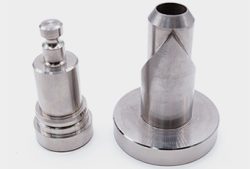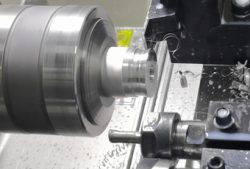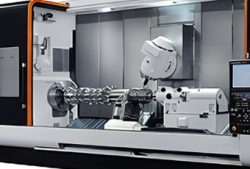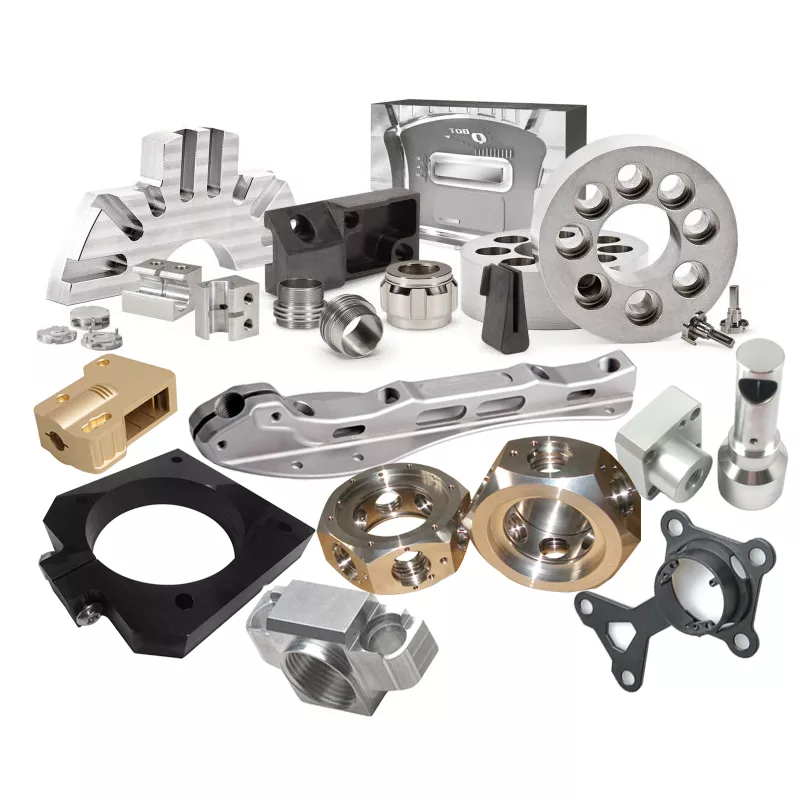Precision CNC Turning Services for Complex Components
CNC metal turning services provide an effective way to transform a solid chunk of raw metal into a custom finished product designed to your project’s exact specifications. Whether your part requires turning, milling, boring, or tapping, RJCmold provides enhanced part customization with short lead times. We will work directly with you to provide exceptional service for your CNC Turning requirements.
With advanced technology software and extensive experience working with exotic alloys and specialty metals, RJCmold has the CNC turning expertise for all your complex machined component needs. We work with CAD and additional software to produce mission-critical components for all types of production volumes.
Our in-house 18” diameter x 20” length Turning centers allow our skilled machinists to form performance-built components from specialty metals. As an industry AS9100 and ISO9001:2015 certified machine shop, we ensure you will receive the high-performance components you want with the mission-critical configurations you need.
Contact a RJCmold expert or submit an RFQ online and let us machine parts based on your specifications.
RJCmold CNC Turning Service
Our CNC turning process produces custom prototypes and end-use production parts in as fast as 1 day. We use a CNC lathe with live tooling so features like axial and radial holes, flats, grooves, and slots can be machined.
From CNC Prototyping to Production
CNC machining is a computerized and versatile manufacturing process ideal for rapid prototyping and on demand production. Here are the custom CNC services available at the RJCmold.

Rapid Prototyping
With our instant quotation platform and strong capacity, you can get excepted prototypes in short lead times. This allows you to quickly test prototype parts and get them to market.

Bridge Production
Bridge-to-production is critical for closing the gap between the part design and the actual product rollout. No worries. Our professional engineering team is always ready to provide practical design suggestions for your low volume machined parts.

On-Demand Production
Our full service for on-demand production orders ensures that you get high precison and high standard of quality products. Enhanced production rate also allows for just-in-time delivery of production parts.
Advantages of CNC Turning
CNC lathes remove a lot of material quickly. And when using fine cutting tools such as our Guhring cutters, the surface finish is excellent and doesn’t need any post-finishing. Turning is really the only practical way to make internal and external threads, long bores, tapers, ring grooves, and many other features that are essentially round in cross-section. Some of these same features can also be made on a CNC mill, but this would be slower and is not optimized for maximum efficiency.

Differences Between CNC Turning and Milling
There are multiple differences between CNC turning and CNC milling. During CNC turning, the workpiece rotates while a cutting tool subtracts material. CNC milling uses a different approach, moving the tool along a stationary workpiece. CNC turning is good for projects that need cylindrical part, whereas CNC milling should be used for projects where cylindrical features are not required. CNC milling may be used as a secondary finish to add definition. Complex parts that require prismatic and cylindrical features may use a combination of milling and turning.
CNC Turning Tolerances
As an ISO 9001 certified company, we machine CNC turning lathe parts to meet tight tolerance requirements. Based on your design, our CNC lattes can reach tolerances of up to ±0.005”. Our standard tolerances for CNC milled metals is ISO 2768-m and ISO 2768-c for plastics.
| Description | General Tolerance |
|---|---|
| Distance Dimensions | For features of size (Length, width, height, diameter) and location (position, concentricity, symmetry) +/- 0.005”. |
| Orientation and Form Dimensions | 0-12″ +/- 0.005″, Angularity 1/2 degree. For 24″ and beyond please consult RJCmold’s Manufacturing Standards. |
| Edge Condition | Sharp edges will be broken and deburred by default. Critical edges that must be left sharp should be noted and specified on a print. |
Please check out RJCmold’s Manufacturing Standards for more information on tolerances per process. Unless we have agreed to other tolerances in your Quote, we will work to achieve and hold the tolerances noted.
RJCMold CNC Materials
Our CNC turning processes are compatible with a wide range of materials, including machine-grade metals and plastics. Depending on your applications, we can create precise rapid prototypes and low-volume production from various superior-quality materials. Check out some of the common materials for your CNC turning projects.
| Material | Available Varieties |
|---|---|
| Aluminum |
|
| Brass/Bronze |
|
| Copper |
|
| Plastics |
|
| Steel |
|
| Titanium |
|
| Zinc |
|
Additional alloys and tempers are available upon request. We can source to your project specifications.
Surface Finishes for CNC Turning
With a wide selection of surface finishes, RJCmold can help improve the surface qualities of your products. Surface finishes applied to your CNC turned parts aim at improving their appearance, surface hardness and roughness, chemical and corrosion resistance, etc. They also help hide any visible tool marks from areas cut with live tooling. Here are some of your top choices.

What is CNC Turning?
Turning is a process by which material is cut to create round shapes, typically using a CNC Lathe. The workpiece is placed inside the lathe and rotates while a cutter removes material until only the desired shape remains.
Turning is ideal for cylindrical parts and is primarily done using round rod material, but square and hexagonal bar stock can also be used.
The primary objective of CNC turning is to machine parts having shapes that can be formed by feeding a cutter into a rotating bar of raw material. Turning can also be used to reduce the diameter of a workpiece to a desired dimension. Lathe turning is mainly used for shaping metal or wood. CNC lathes are commonly used in metalworking and metal spinning processes. CNC lathes produce accurate round shapes, often with precision outer diameter (OD) and inner diameter (ID).

